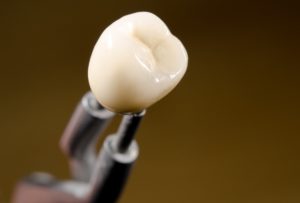J. Peter St. Clair, DMD Blog
THE WAY DENTISTRY IS MEANT TO BE
November 8, 2021
 We all have people we look up to, whether in our personal or professional life. One of those people in my professional life is the late Dr. LD Pankey. Dr. Pankey was a true visionary. There is an advanced dental education institute named after him in Florida, where dentists learn from his influential teachings.
We all have people we look up to, whether in our personal or professional life. One of those people in my professional life is the late Dr. LD Pankey. Dr. Pankey was a true visionary. There is an advanced dental education institute named after him in Florida, where dentists learn from his influential teachings.
I recently read an article he wrote in 1981, 8 years before his death. It is interesting to read some of the things he wrote, because it shows how little things have changed, and how well he understood people and his profession. I would like to share a few paragraphs from this piece:
“Another important element, then, in the future of dentistry is determining the answer to the question: why don’t more people with needs go to the dentist? In-depth studies on consumer attitudes have turned up a host of reasons, but one surpasses all the rest. Most people who fail to seek dental care fail because they don’t perceive their need. More astounding than that is the fact that the majority of people who do go to the dentist don’t perceive the need either!
If the public is ever to be enlightened about the importance of dental health, who will have to do the enlightening? I’ve never found anyone else I could depend on to do it. I had to build the one-to-one relationships with my patients that were needed to make my practice- and thus the future of dentistry- prosper and grow.
People with dental needs are out there, all right, but even when they do perceive their need, they must be assured there’s someone available who will identify with what they’re feeling and devote themselves to helping them to be healthy, happy and whole.” (more…)
Need a Crown? Choose the Best Material
November 5, 2021
 A dental crown remains the most common restorative procedure, despite countless advancements in dentistry. Placing a custom-made cap over the surface of a tooth is an effective method to improve the health and appearance of your smile. Various materials can be used to make your restoration, including those that look natural. Your dentist will explain the pros and cons of each during your initial consultation. Don’t feel overwhelmed by all the options. Here’s how to choose the best dental crown material for your smile.
A dental crown remains the most common restorative procedure, despite countless advancements in dentistry. Placing a custom-made cap over the surface of a tooth is an effective method to improve the health and appearance of your smile. Various materials can be used to make your restoration, including those that look natural. Your dentist will explain the pros and cons of each during your initial consultation. Don’t feel overwhelmed by all the options. Here’s how to choose the best dental crown material for your smile.
(more…)
INTEGRATIVE HEALTH CARE
November 1, 2021
 Dentistry is one of those things in life….as with most things…. that people view in different ways. Some are interested in their appearance, some are interested in their health, some both, and others none of the above. A major role of health care providers is to make patients aware of the possibilities to improve their quality of life. When our services are perceived as a commodity, expectations are often not achieved.
Dentistry is one of those things in life….as with most things…. that people view in different ways. Some are interested in their appearance, some are interested in their health, some both, and others none of the above. A major role of health care providers is to make patients aware of the possibilities to improve their quality of life. When our services are perceived as a commodity, expectations are often not achieved.
Dentists play a key role in screening patients for many disorders relative to nutrition and in providing appropriate referrals into the health care system. Although the importance of integrating diet and nutrition guidance into dental care has been advocated for decades by educators, it continues to be ignored except by a handful of prevention-oriented practitioners. (more…)
THE ORAL-SYSTEMIC LINK 3/3
October 25, 2021
 If you missed Part 1 and/or 2 of this series, you can find it at www.thetowncommon.com.
If you missed Part 1 and/or 2 of this series, you can find it at www.thetowncommon.com.
I have been writing the past couple weeks about the growing evidence that links oral and systemic disease, and the need for more collaboration between dentists and physicians. All of this, of course, is in the best interest of the patient.
The discussion has been primarily about gum disease and its relationship with systemic disease. The body is a complex system – and everything is connected. In addition to the need for dentists and MD’s to collaborate more on the oral/systemic connection, we also need to collaborate better about our patient’s sleep problems.
As part of a comprehensive approach to care, we screen for sleep issues with our patients. it amazes me how many people have issues with their sleep. It amazes me even more when I learn that many of these people have never even had a conversation with their doctor about sleep. Experts in sleep medicine agree that there is much room for improvement in this vital part of our health care. (more…)
THE ORAL-SYSTEMIC LINK 2/3
October 18, 2021
If you missed Part 1 of this series, you can find it at www.thetowncommon.com.
I ended last week with a statement that I have used numerous times before – just because it doesn’t hurt doesn’t mean there isn’t a problem. We keep learning more and more about the link between the mouth and the rest of the body. It is essential that dentists and physicians do a better job at co-managing patients, and learn more about the relationship between oral and systemic disease. (more…)
THE ORAL-SYSTEMIC LINK 1/3
October 12, 2021
 The connection between oral health and systemic health is well-established and ever-evolving. One thing we know for certain; we are living longer, but with more chronic diseases and medication than ever before.
The connection between oral health and systemic health is well-established and ever-evolving. One thing we know for certain; we are living longer, but with more chronic diseases and medication than ever before.
The latest statistics are alarming. Forty-seven percent of US adults who are age 30 or older – an estimated 64.7 million Americans – have either mild gum disease (8.7%), moderate gum disease (30%) or severe gum disease (8.5%). As the population ages, the prevalence rises with 70% of individuals over the age of 65 exhibiting some level of gum disease. And, since we are on statistics, by 2030, it is estimated that the number of people over 70 years of age will have doubled from 35 million to 71 million.
So, as we age, our risk of developing disease increases. Interestingly, there is also a direct correlation between the regions of the US with the greatest concentration of gum disease, and those that have a high incidence of cardiovascular disease and diabetes. Although a direct cause-and-effect link is still in the process of being established between gum disease (periodontitis) and other systemic diseases, inflammation is often a common denominator. And it is always important to remember that the mouth is the gateway to the rest of the body. (more…)
5 Myths About Root Canals
October 7, 2021
If you recently learned that you need a root canal, your first instinct may have been to go online to do some research on the procedure. The Internet can be a great learning tool, but it’s also full of misconceptions about treatments like root canal therapy. To help you separate rumors from reality, here are five common root canal myths in Rowley.
DON’T WASTE BENEFITS
October 4, 2021
October is here!! This means only 3 months left in 2021. It’s crunch time to get everything done that we haven’t gotten done during the rest of the year. For those with remaining dental benefits, it’s also the time of year to consider utilizing those so you don’t lose them.
Unused dental benefits go directly back to the insurance company, which generates hundreds and hundreds of thousands of dollars for the insurance companies each year. Dental insurance companies count on the fact that many people will not claim their $1000 or so in benefits by the end of the calendar year. Those with dental benefits should look for legitimate means to use these benefits before they are lost, especially if you haven’t been to a dentist in a while. (more…)
5 Myths About Root Canals
October 1, 2021
If you recently learned that you need a root canal, your first instinct may have been to go online to do some research on the procedure. The Internet can be a great learning tool, but it’s also full of misconceptions. To help you separate rumors from reality, here are five common root canal myths in Rowley – debunked!
WHAT DO YOU WANT?
September 27, 2021
Gravity is precise in nature, governed by laws and formulas; it does not respond to individual circumstances or objectives. It’s easy because it always works. Clinical dentistry, on the other hand, is science for sure, but an inexact science at best. Inexact science requires the skill of an artist to create a consistent and predictable result, since it is not a matter of an equation; hence the “Art and Science of Dentistry.” This inexactness is something that dentists struggle with daily.
I am currently treating a patient who presented with a bunch of broken teeth. The patient is frustrated because these teeth have been “fixed” numerous times over the past few years. His previous dentist had tried to bond things here and there to keep the cost down for the patient, but they just kept breaking. The patient, an engineer, said that he even tried giving the dentist suggestions to make things “stronger”. Those suggestions only led to more failure. Predictable dentistry often requires doing things that you would rather not do.
I recently heard an ad on the radio with a famous actor talking about colon cancer screening. He describes that having a colonoscopy after age 50 is huge in finding and treating early changes that lead to colon cancer. Most people don’t want to have a colonoscopy, but also don’t want to get colon cancer, so there is a dilemma. These actions have now become inconsistent with the desired outcome, much like the patient I just described. He doesn’t want to have a complete exam and map out a precise treatment plan that will ensure a more predictable result, but he wants to save his teeth. (more…)







